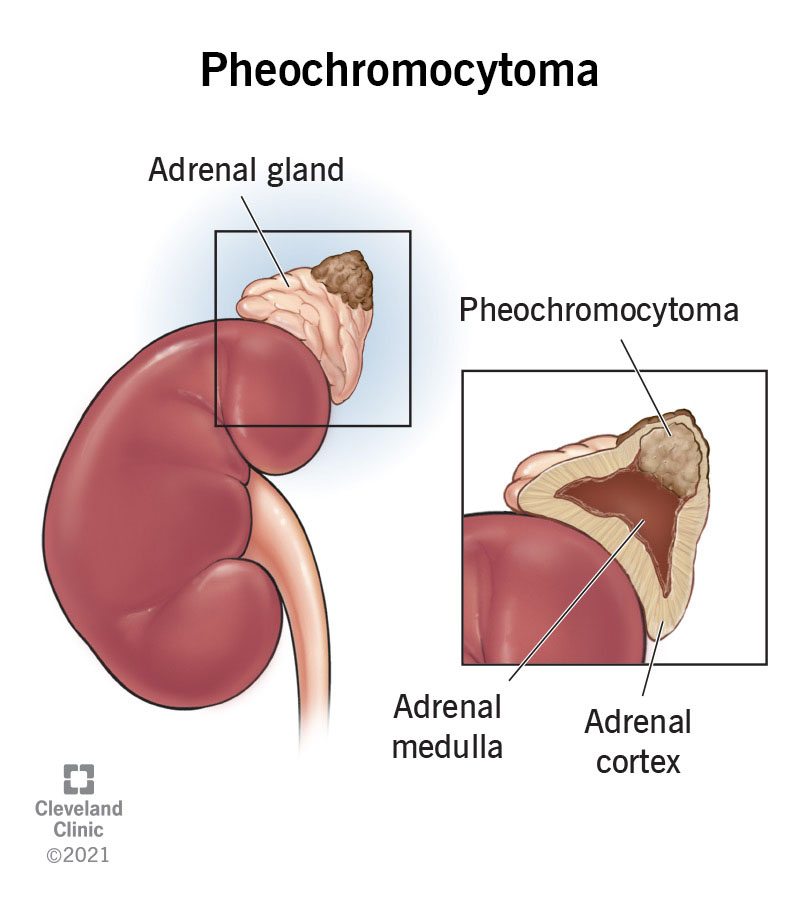A patient with pheochromocytoma
is admitted to the hospital with severe hypertension. Which nursing intervention is the highest priority?
Administering an alpha-adrenergic blocker as prescribed.
Administering intravenous fluids to maintain hydration.
Monitoring blood glucose levels every 4 hours.
Preparing the patient for immediate surgery to remove the tumor.
The Correct Answer is A
Choice A Reason:
Administering an alpha-adrenergic blocker is the highest priority intervention for a patient with pheochromocytoma and severe hypertension. Pheochromocytoma causes excessive secretion of catecholamines, leading to severe hypertension. Alpha-adrenergic blockers help to control blood pressure by blocking the effects of these catecholamines, thereby reducing vasoconstriction and lowering blood pressure. This intervention is crucial to prevent hypertensive crises and associated complications such as stroke or myocardial infarction.
Choice B Reason:
Administering intravenous fluids to maintain hydration is important but not the highest priority. While maintaining hydration is essential, it does not directly address the severe hypertension caused by pheochromocytoma. Intravenous fluids can help support overall patient stability but do not specifically target the underlying cause of the hypertension.
Choice C Reason:
Monitoring blood glucose levels every 4 hours is a necessary intervention, especially since pheochromocytoma can cause hyperglycemia due to increased catecholamine levels. However, this intervention is not the highest priority compared to controlling the severe hypertension, which poses a more immediate threat to the patient’s health.
Choice D Reason:
Preparing the patient for immediate surgery to remove the tumor is a critical step in the long-term management of pheochromocytoma. However, surgery is not typically performed until the patient’s blood pressure is stabilized with medications such as alpha-adrenergic blockers. Therefore, while surgery is essential, it is not the immediate priority in the acute management of severe hypertension.

Nursing Test Bank
Naxlex Comprehensive Predictor Exams
Related Questions
Correct Answer is A
Explanation
Choice A Reason:
Monitoring platelet counts and assessing for signs of bleeding is crucial for managing thrombocytopenia. Thrombocytopenia is characterized by a low platelet count, which increases the risk of bleeding. Regular monitoring helps in detecting any significant drops in platelet levels, allowing for timely interventions to prevent severe bleeding. Assessing for signs of bleeding, such as petechiae, bruising, or nosebleeds, is essential to manage the condition effectively and prevent complications.
Choice B Reason:
Administering aspirin to manage pain and prevent clot formation is not appropriate for patients with thrombocytopenia. Aspirin is an antiplatelet agent that inhibits platelet function, which can exacerbate bleeding tendencies in patients with low platelet counts. Using aspirin in this context could increase the risk of bleeding and is therefore contraindicated.
Choice C Reason:
Administering a diuretic to reduce fluid retention and swelling is not relevant for managing thrombocytopenia. Diuretics are used to manage conditions like hypertension and edema but do not address the underlying issue of low platelet counts. In fact, diuretics can lead to electrolyte imbalances, which may complicate the patient’s condition further.
Choice D Reason:
Encouraging the patient to increase physical activity to improve circulation is not a priority intervention for thrombocytopenia. While physical activity is generally beneficial for overall health, it can increase the risk of trauma and bleeding in patients with low platelet counts. It is important to avoid activities that could lead to injury and bleeding in these patients.
Correct Answer is B
Explanation
Choice A Reason:
Resuming an exercise routine immediately after cochlear implant surgery is not advisable. Postoperative care guidelines typically recommend avoiding strenuous activities for a period of time to allow the surgical site to heal properly. Engaging in exercise too soon can increase the risk of complications such as bleeding or dislodging the implant.
Choice B Reason:
Eating soft foods is recommended after cochlear implant surgery to avoid putting strain on the surgical site and to ensure comfort while chewing. Soft foods are easier to manage and less likely to cause discomfort or disrupt the healing process. This choice is appropriate for promoting a smooth recovery.
Choice C Reason:
Washing your hair 24 hours after surgery is generally not recommended. Most postoperative care instructions advise keeping the surgical site dry for at least a few days to prevent infection and ensure proper healing. Washing the hair too soon can introduce bacteria to the incision site and increase the risk of complications.
Choice D Reason:
Lying on your back when sleeping is often recommended to avoid putting pressure on the surgical site. However, this instruction alone does not address the immediate dietary needs of the patient, which are crucial for comfort and recovery in the initial postoperative period.
Whether you are a student looking to ace your exams or a practicing nurse seeking to enhance your expertise , our nursing education contents will empower you with the confidence and competence to make a difference in the lives of patients and become a respected leader in the healthcare field.
Visit Naxlex, invest in your future and unlock endless possibilities with our unparalleled nursing education contents today
Report Wrong Answer on the Current Question
Do you disagree with the answer? If yes, what is your expected answer? Explain.
Kindly be descriptive with the issue you are facing.
